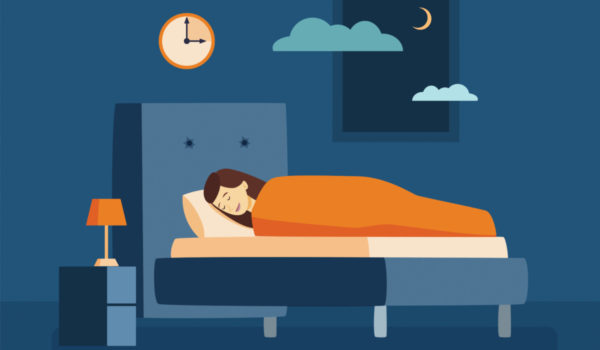
By Jessica Dyer Campbell
Catching some zzzs is vital for good health
We are chronically under-rested, and often we pride ourselves on being able to function on little sleep. But according to experts, that’s bad for our long-term health.
“We have this tendency to devalue sleep,” says Dr. Faheem Abbasi, a pulmonologist and sleep medicine specialist at Community South Hospital. “I hear this all the time. People will say, ‘I can survive on five hours of sleep.’” But, he says, “that doesn’t make you tough; you’re actually jeopardizing your health.”
Dr. Isam Habib, a pulmonologist and sleep medicine specialist at Johnson Memorial Hospital, says the recommended amount of sleep for people varies with age:
Children older than 6: at least nine to 12 hours.
Teenagers: Eight to 10 hours.
Adults: Seven to nine hours of sleep a night.
“Everybody, and every animal, needs sleep,” says Dr. Keith Cushing, neurologist and sleep disorder specialist at JWM Neurology. It’s a vital function. For humans, that means we sleep for one-third of our lives. Sleep gives our bodies the opportunity to restore, clear out waste from the brain, secrete growth hormones and conserve mental and physical energy.
If you’re getting enough sleep, the benefits might seem invisible, but rest assured: They are present. According to Dr. Shalini Manchanda, director of the IU Health Sleep Disorders Center, well-rested people perform better on tasks, have better clarity of mind and make fewer errors than sleep-deprived people.
What happens when you don’t get enough sleep
“The importance of sleep is underscored by the consequence of not getting enough sleep,” Cushing says. “If you don’t get enough sleep, you’ll have poor cognitive and physical performance during the day. It can impact your productivity. You can have decreased attention and awareness.”
Most people have experience with acute sleep deprivation — staying up all night to finish a paper or study for a test, for example — those one-time “all-nighters” where you get just a couple of hours of sleep.
Chronic sleep deprivation is also common, but less obvious. Adults who get fewer than five hours of sleep a night, over weeks or months or years, may have chronic sleep deprivation, according to Manchanda. And that can have serious consequences. Studies have shown that over the long term, people who don’t get enough sleep die earlier, she says.
Lack of sleep will put you at a higher risk for cardiovascular diseases, according to Habib, such as high blood pressure, stroke and heart disease.
After just 10 to 14 days of sleep deprivation, your immune system is adversely affected.
“If you’re continuously sleep deprived all the time, it can lead to an impaired immune response,” Abbasi says. “So you’re more susceptible to get infections.”
Common sleep problems
Lung diseases such as asthma or emphysema can contribute to a chronic, sleep-related breathing disorder commonly called sleep apnea. Patients with this disorder stop breathing many times while sleeping. This chronic disorder is often treated with a continuous positive airway pressure machine.
Narcolepsy is a hypersomnia disorder where a person is excessively sleepy during the day even if they’ve received adequate sleep overnight, Abbasi says. It can present itself in the third or fourth decade of life.
Psychological conditions such as anxiety, depression and post-traumatic stress disorder contribute to insomnia, Habib says.
Our dependence on electronic devices for work and pleasure has increasingly affected our sleep lives, too. This tends to present itself as insomnia, a condition in which we’re not able to turn off our minds and rest.
“We have all these things to distract us,” Abbasi says. “People don’t even think twice about it. They keep their cellphone next to them in bed, and it wakes them up and disturbs their nighttime sleep.” When patients come to him with insomnia, they often report that their minds are racing and they can’t fall asleep. Use of social media and poor sleep hygiene habits contribute to this, he says.
“They keep on stimulating their mind right until the very minute they go to sleep. It’s not just an on-off switch. You have to gradually turn it off,” Abbasi says. “You have to gradually let things cool down. Relax. Do something relaxing. But that has to be 30, 45 minutes, an hour before you go to bed.”
When to get help, what to expect
Cushing recommends seeking professional help if your daytime sleepiness affects your quality of life. Start with your regular physician. If you end up seeing a sleep specialist, expect that visit to go like any other physician visit you may have experienced. The doctor will take a medical history and talk through what problems you’re having. If you have a bed partner — someone who regularly shares a bed with you — bring that person along to help describe what might be occurring while you’re asleep. (Do you snore? Do you stop breathing? Do you act out your dreams?)
You may need to keep a sleep journal or do a sleep study either in the clinician’s lab or in your home. After collecting the data, the physician will make a recommendation for treatment.
“So many of us are sleep-deprived for long periods of time. Obviously, we survive it. We get through it. And we’re not all completely debilitated,” Cushing says. “The body’s very resilient. It’s just not ideal.”
Abbasi says that naps certainly help if you’re not getting enough sleep at night. If you do nap, aim for 45 minutes, but not more than an hour, to get the most benefit.
Set the tone
To set yourself up for success and get the recommended seven to nine hours of uninterrupted sleep each night, the doctors recommend developing good sleep habits or sleep hygiene. It takes time, work and commitment, but the lasting benefits for people of any age are worth it.
Have a fixed bed time and wake time every day. If you know you need to wake up at 6 a.m., and that you need eight hours of sleep, you should endeavor to be in bed before 10 p.m. every night. Try not to disrupt the routine too much on weekends or non-working days.
Create a relaxing bedtime routine to give your brain the opportunity to wind down. Don’t eat large meals or exercise right before bed. (Aim to have those tasks completed three to four hours before bed.) Keep your bedroom cool and use it only for sleeping and sex. Turn down the lights. Close the curtains or install room-darkening shades if you need to sleep during the day. Take a warm shower or bath if that helps relax you.
Turn off your electronic devices 30 minutes to one hour before bedtime. Your laptop, computer, TV, smartphone and tablet all produce blue light that suppresses the sleep-inducing melatonin your body begins producing two to three hours before bedtime.
Avoid caffeine, alcohol, nicotine and cannabis before bed. Though some substances may help you fall asleep, they may cause restless sleep or may prevent you from staying asleep all night. Caffeine can linger in the body up to eight hours. Avoid drinking a lot of fluids before bed, too.
Don’t go to bed unless you’re sleepy. It might seem counterintuitive, but lying awake in bed thinking about how you need to sleep only perpetuates sleeplessness. If, after 20 to 30 minutes you’re still awake, get out of bed and do something low key and nonstimulating.


